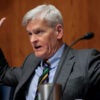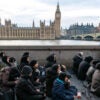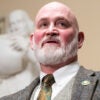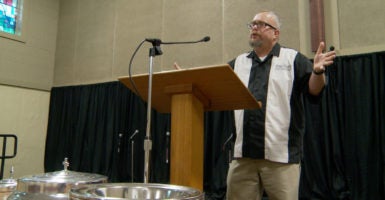A small Iowa church has entered a legal battle with the state government over what the congregation considers censorship of biblical teaching on human sexuality.
The dispute began with a brochure published by the Iowa Civil Rights Commission about state law’s protections for sexual orientation and gender identity. The document explained how the law applies to places of public accommodation—and included churches among places such as restaurants and hotels.
In the brochure, the state agency interpreted the Iowa Civil Rights Act “to apply to churches anytime that they hold worship services that are open to the public, as all worship services are,” Christiana Holcomb, a lawyer with Alliance Defending Freedom, told The Daily Signal.
The Christian legal aid group represents Fort Des Moines Church of Christ. It filed a federal lawsuit July 4 on behalf of the church, located in the state capital of Des Moines.
As defendants, the suit names officials at the Iowa Civil Rights Commission, the attorney general of Iowa, and the city of Des Moines.
“No American, no citizen, has to wait for the government to enforce an unconstitutional law against them,” Holcomb said.
The commission’s interpretation of the civil rights law “does basically two things,” Holcomb told The Daily Signal:
One, it tells the church that you’re not allowed to teach or do anything, including what a pastor preaches from the pulpit, if it would make anyone feel uncomfortable based on their gender identity. A logical extension of that would mean that a pastor couldn’t preach about God’s design for human sexuality and biological sex.
The second component … is that a church that holds a worship service open to the public would no longer be allowed to have sex-designated sensitive areas like restrooms and locker rooms and shower and changing facilities.
‘Able to Choose What We Believe’
Alliance Defending Freedom’s motion for a preliminary injunction, filed July 14, asks a federal court to stop the state commission from using the law against the church while the lawsuit progresses.
Fort Des Moines Church of Christ, pastored by Michael Demastus, believes and teaches that God created each person either male or female, the lawsuit says.
“We can agree or disagree with what Fort Des Moines Church of Christ believes about the issues of gender identity and sexual orientation, and that’s fine,” Holcomb said. “In a diverse marketplace of ideas, we should each be able to choose what we believe.”
“But the real problem in Iowa is … you have a government trying to come in and dictate to a church what it believes and how it uses its house of worship.”
Peter Kirsanow, a member of the U.S. Commission on Civil Rights, wrote a letter July 13 to Angela Jackson, chairman of the Iowa commission, arguing that her agency’s approach “plainly violates both the free exercise clause and the establishment clause of the First Amendment of the United States Constitution.”
>>> Pastor Says State Law Threatens His Right to Teach the Bible in His Church
Fort Des Moines Church of Christ, Holcomb said, “discovered that an unelected commission in the state of Iowa had published this brochure” explaining the civil rights law.
The Iowa Civil Rights Commission revised its brochure July 8, four days after the church sued, clarifying that churches are generally exempt from the state law “unless the place of worship engages in nonreligious activities which are open to the public.”
Another church, Cornerstone World Outreach in Sioux City, Iowa, and its senior pastor, Cary Gordon, took legal action against the state commission for similar reasons, as The Daily Signal previously reported.
Holcomb said the state agency not only has the authority to interpret the Iowa’s civil rights law, but to enforce it, so it could use the statute to “infringe on a church’s religious freedom.”
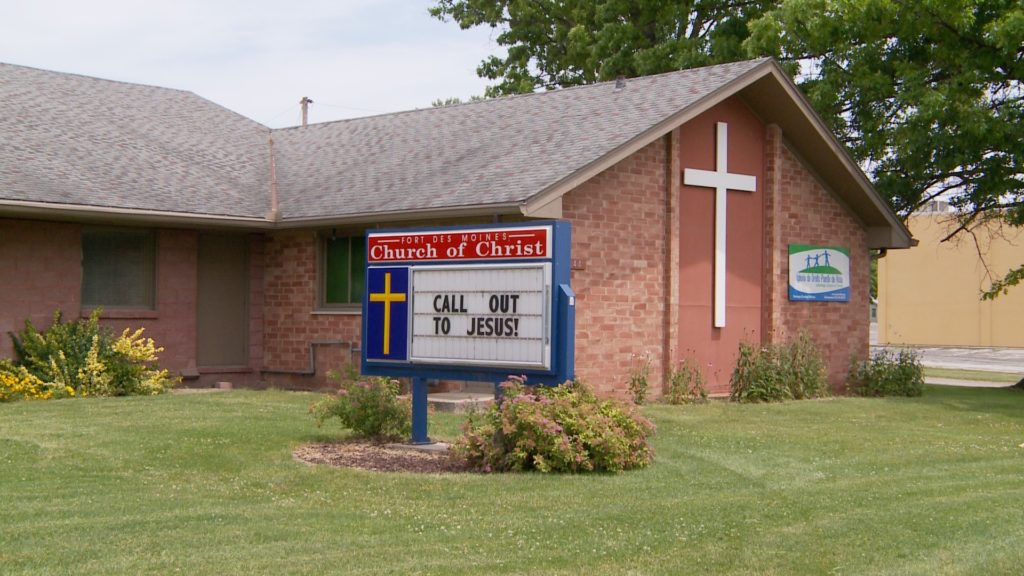
Fort Des Moines Church of Christ tries “to be faithful to God’s Word and call on our lives,” its website says. (Photo courtesy Alliance Defending Freedom)
‘Complementary Halves of Humanity’
According to its website, Fort Des Moines Church of Christ is a nondenominational congregation that is “simply trying to be faithful to God’s Word and call on our lives.”
“The church believes that God intentionally and purposefully created males male and females female, and that these two complementary halves of humanity reflect God’s image,” the lawsuit says.
Church policy for sex-specific private spaces states that restrooms and showers may be used only by members of the designated biological sex, according to the lawsuit.
While the commission has not taken action against Fort Des Moines Church of Christ, Holcomb said, the church was “deeply concerned” the agency could start enforcement proceedings.
Saying it wanted to get clarity for Iowa churches, Alliance Defending Freedom filed the lawsuit as a pre-enforcement challenge to the law.
>>> Iowa Civil Rights Agency Says It Won’t Tell Pastors What to Preach on Sexuality
Kristin H. Johnson, the state commission’s executive director, declined to comment to The Daily Signal.
In a prepared statement July 8, Johnson said the commission “has not done anything to suggest it would be enforcing these laws against ministers in the pulpit, and there has been no new publication or statement … raising the issue.”
The Des Moines church’s lawyers argue that the law bans expressing any views on sexuality that would “directly or indirectly” make individuals “unwelcome” based on their gender identity. In its description of the case, Alliance Defending Freedom writes:
The speech ban could be used to gag churches from making any public comments—including from the pulpit—that could be viewed as unwelcome to persons who do not identify with their biological sex because the commission has stated that the law applies to churches during any activity that the commission deems to not have a ‘bona fide religious purpose.”
‘It Could Flip-Flop Again’
The civil rights law was amended in 2007 to include gender identity and sexual orientation as classes protected from discrimination at places of public accommodation, Johnson said in the prepared statement.
“The commission regrets the confusion caused by the previous publication,” Johnson said, and “has never considered a complaint against a church or other place of worship on this issue.”
Alliance Defending Freedom’s Holcomb said “cosmetic changes” to the commission’s brochure aren’t enough and highlight “the underlying vagueness of the state law at issue.”
“The commission could change its mind tomorrow about the brochure and reissue the old one,” Holcomb said, “or a month or a year down the line, it could flip-flop again on this issue.” She added:
It just highlights that the commission has too much power, too much authority to try to apply the law to churches, which are not places of public accommodation. They are places of worship and should enjoy full and robust freedom under the First Amendment.
Who gets to decide what is or is not a religious purpose? Is that something that’s being left in the hands of unelected bureaucrats, or is that something that the church gets to determine?



